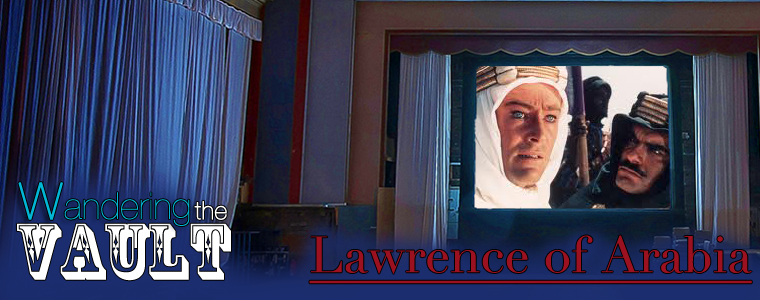An Epic for Its Time
by Andrew Collins
It’s a pity that the term “epic” has suffered so much overuse and degradation of late, because Lawrence of Arabia (1962) is one of those films that lives up to the word in all of its fullness. You liked Braveheart, Gladiator, and Lord of the Rings? Meet their granddaddy.
Lawrence of Arabia is epic first in pacing, length, and subject, dragging on for more than 200 minutes and dividing into two feature-length parts. The first half nearly put me to sleep, but if you can stick with it, it pays off. The film recounts the World-War-I-era story of a young British soldier named Thomas Lawrence. Widely regarded by his superiors as useless, Lawrence is dispatched to Arabia, with its largely irrelevant and feuding Arab tribes under Turkish rule, to assess the situation. He soon recognizes that the clans could have great potential as a military and political force if only they would stop fighting among themselves. Lawrence’s status as an impartial outsider, soft-spoken and respectful of the Arab way, makes him the ideal man for the job.
Director David Lean tells the story beautifully. For a film half a century old, the cinematography is stunning. In the age of CGI where filmmakers can conjure any army in any place, I was wowed by some of the vast, panoramic shots of hundreds, if not thousands, of men on horseback performing all sorts of maneuvers. The filmmakers pulled out all the stops to produce this one, and they don’t shy away from showing it off. Lawrence of Arabia treats us to many lengthy, sweeping shots of the Arab desert, drawing us into another world and another era of civilization.
I will say two things about the casting and acting. Peter O’Toole gradually settles into the role of Lawrence, building his character with more and more depth and emotion so that the audience slowly feels his hurts and his struggles with him. With a shock of blond hair and deep blue eyes, he could hardly stand out more from the Arabs he leads. One casting call takes the cake, though, and that is the late Sir Alec Guinness in a role that is decidedly not Obi-Wan Kenobi.
For all of its strengths, Lawrence of Arabia might seem to hold little immediate relevance to viewers today. Some may not feel all that interested in traveling back to the glory days of the British Empire. To borrow a phrase from one of the British generals in the film, we do not particularly care much about a “sideshow of a sideshow” of a war that took place nearly a century ago and hardly involved America. I might never have heard of Thomas Lawrence had I not noticed that some film called Lawrence of Arabia kept popping up in lists of classic and best-ever films.
We should take interest in Lawrence of Arabia though — even beyond its significance in the history of film.
Lawrence’s story is bound to resonate with many people today. He’s a bastard child who somehow ends up on assignment with the British Army in Cairo. Upon being dispatched to Arabia, he chooses to forge his own identity and purpose in a foreign land. He becomes one of the Arabs, assimilating into their culture and lifestyle by learning to ride a camel, refusing to drink unless they drink, donning their garb, and enforcing their legal code when necessary. Yet he still manages to stick to his Western principles of honor, integrity, compassion, and freedom. When his Arab counterparts feud with each other, he consistently steps in with an idealistic cool and calm to offer a better path. Yet during it all, he struggles with his own view of himself — is he really an exceptional person destined for greatness, or just a normal man?
Our generation has grown up hearing all about how special we are. We’re told to follow our dreams. Indeed, as Lawrence says of himself, “nothing is written,” but what happens when those dreams face the cold, hard reality of failure? What happens when we find ourselves alone in pursuit of a cause in which we had once found great significance and camaraderie? What happens when, to our shame, we betray our friends at the first experience of discomfort? Lawrence confronts these questions and more as he seeks to rally the Arab tribes and unite them in defiance of the oppressive Turks for the sake of their own freedom.
Equally as important, Lawrence of Arabia is based on historical events that have massive repercussions for our world today. The conflicts in the Middle East that we hear about in the news every day can be traced in large part back to the Sykes-Picot agreement of World War I (referenced in the film), which ignored existing tribal boundaries and divided up the Arab world into artificial states. The clan-based societies that kept the Arab world fragmented and ultimately stuck under the influence of a major Western power continue to play a part in the chaos in countries like Iraq and Syria today.
If our generation was more historically astute, perhaps we’d find more significance in older films like this one that pull their source material from matters of great historical consequence. Perhaps “the sideshow of a sideshow” matters quite a bit after all.








